人教版(2019)选择性必修 第二册Unit 5 First Aid Learning About Language 学案 (含答案)
文档属性
| 名称 | 人教版(2019)选择性必修 第二册Unit 5 First Aid Learning About Language 学案 (含答案) | 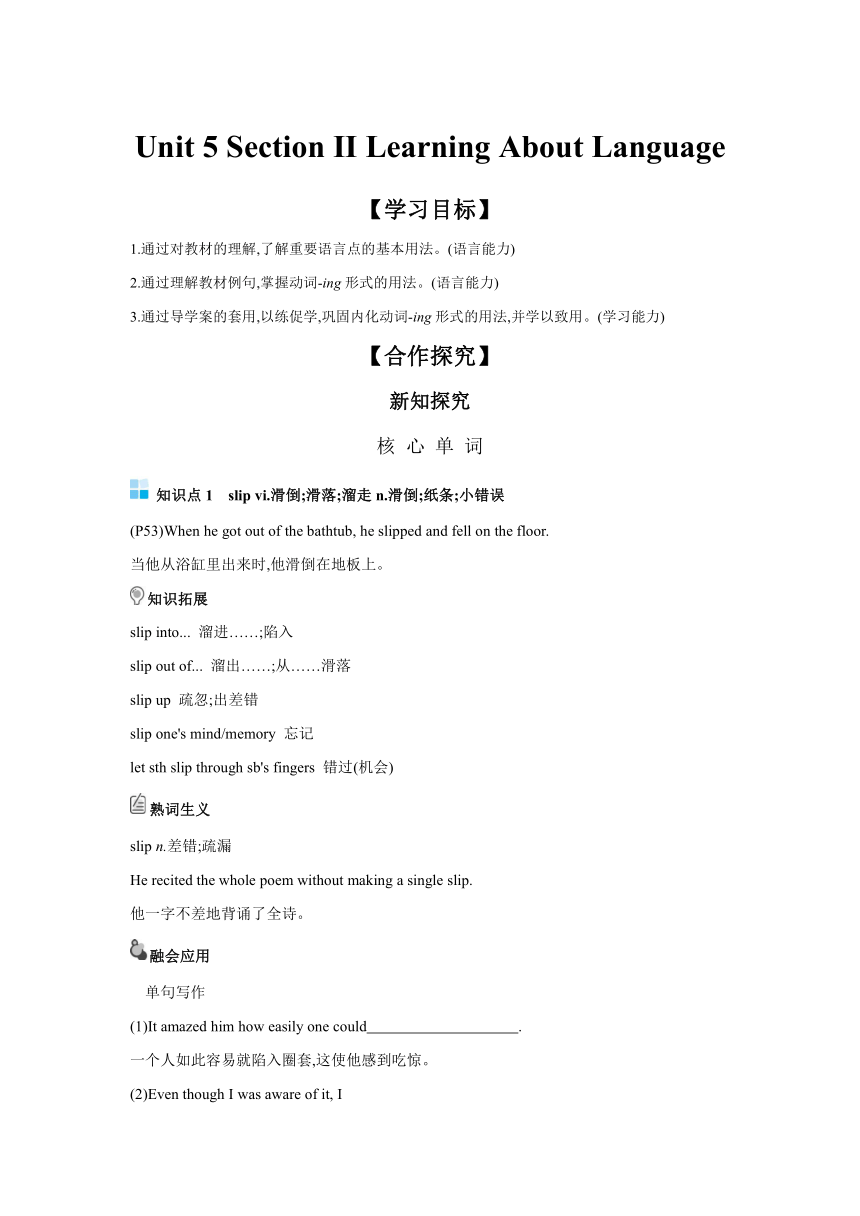 | |
| 格式 | docx | ||
| 文件大小 | 47.1KB | ||
| 资源类型 | 教案 | ||
| 版本资源 | 人教版(2019) | ||
| 科目 | 英语 | ||
| 更新时间 | 2024-04-07 17:21:12 | ||
图片预览

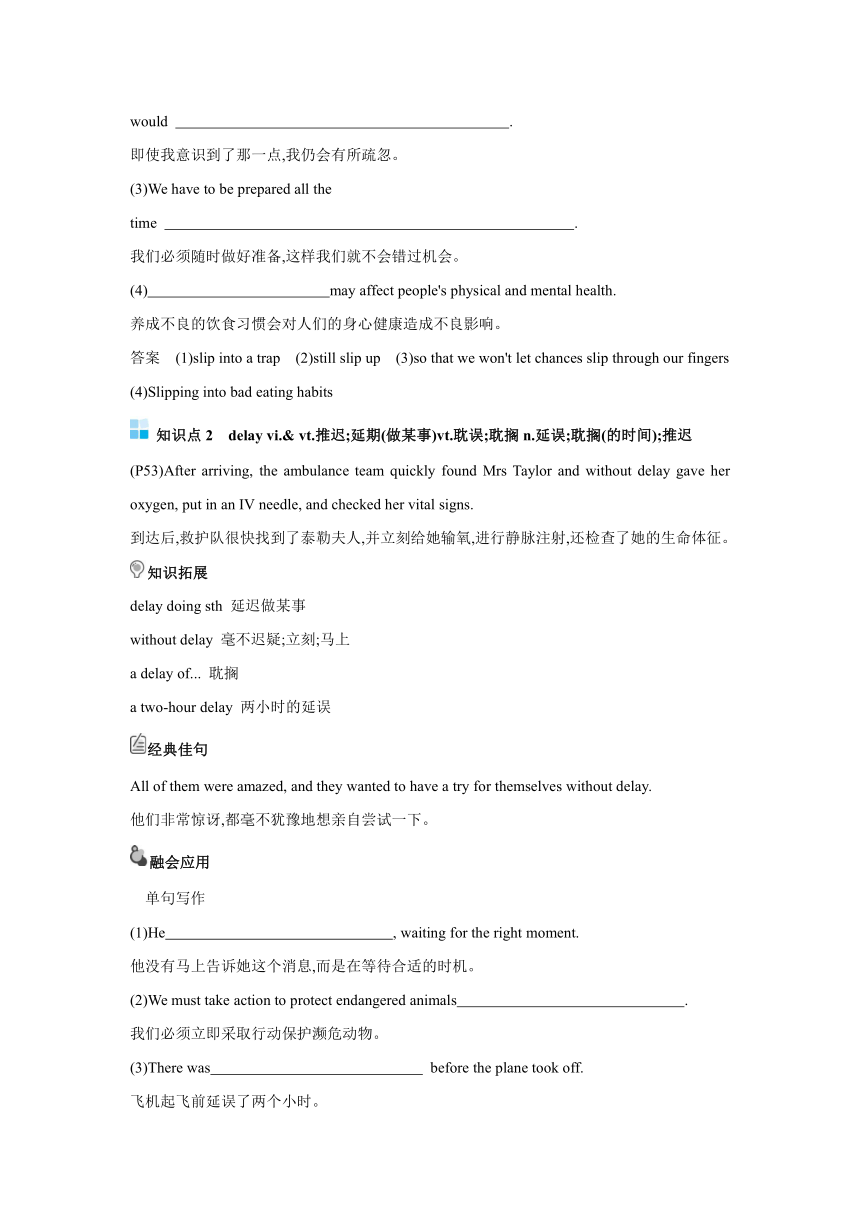
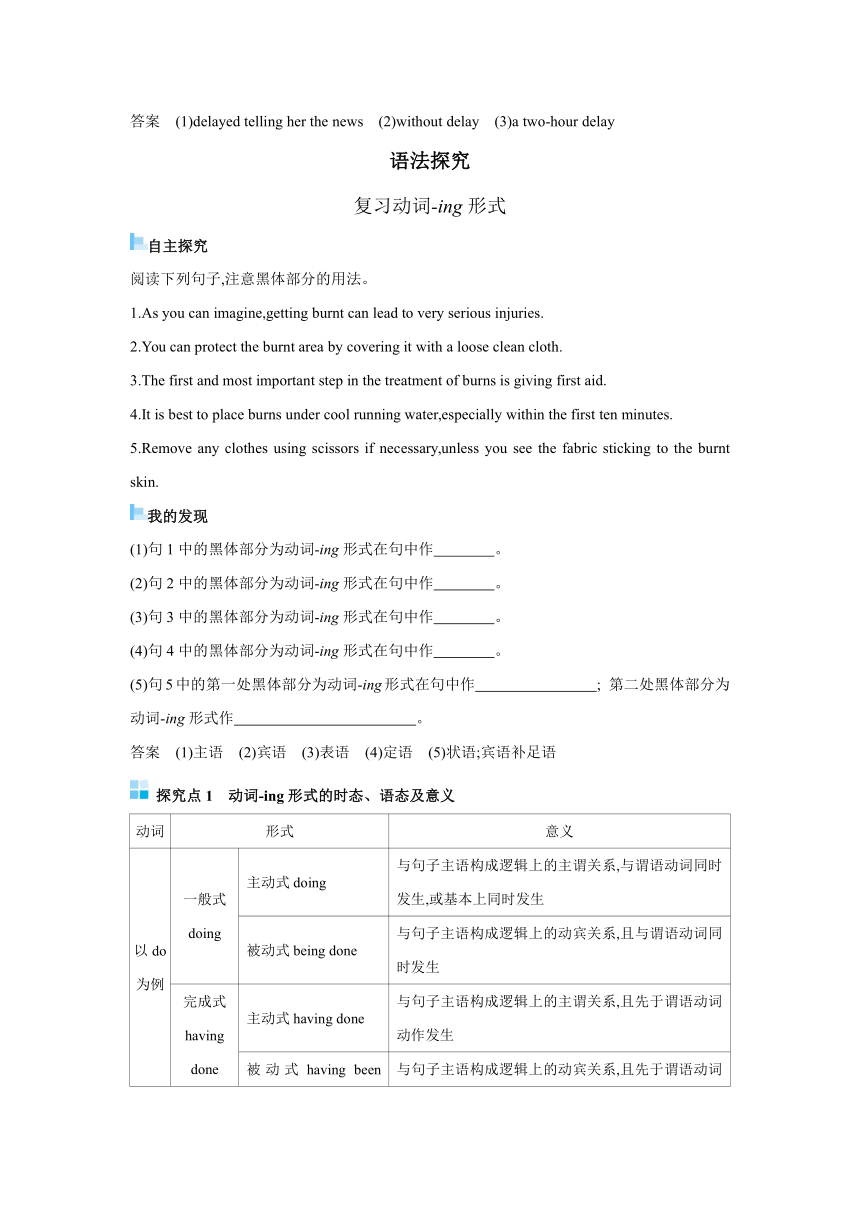
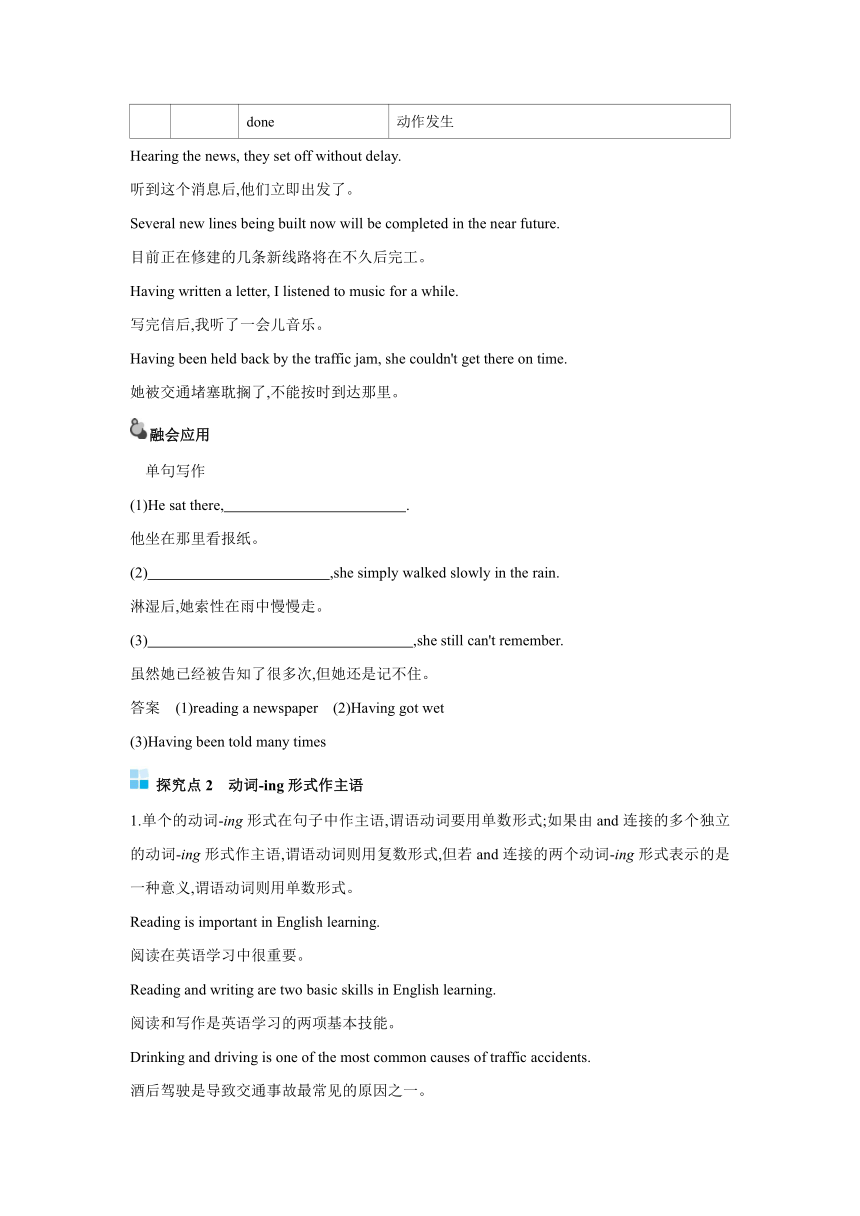
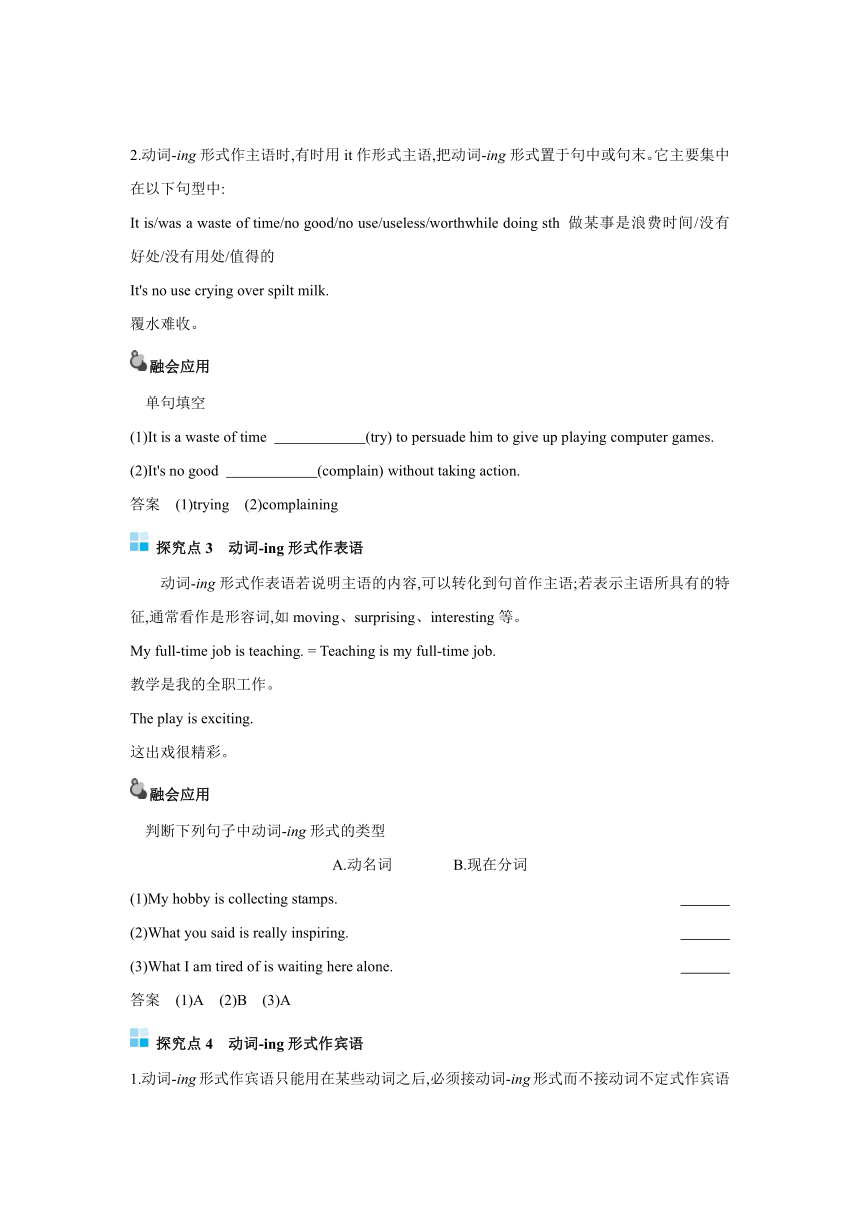
文档简介
Unit 5 Section Ⅱ Learning About Language
【学习目标】
1.通过对教材的理解,了解重要语言点的基本用法。(语言能力)
2.通过理解教材例句,掌握动词-ing形式的用法。(语言能力)
3.通过导学案的套用,以练促学,巩固内化动词-ing形式的用法,并学以致用。(学习能力)
【合作探究】
新知探究
核 心 单 词
知识点1 slip vi.滑倒;滑落;溜走n.滑倒;纸条;小错误
(P53)When he got out of the bathtub, he slipped and fell on the floor.
当他从浴缸里出来时,他滑倒在地板上。
知识拓展
slip into... 溜进……;陷入
slip out of... 溜出……;从……滑落
slip up 疏忽;出差错
slip one's mind/memory 忘记
let sth slip through sb's fingers 错过(机会)
熟词生义
slip n.差错;疏漏
He recited the whole poem without making a single slip.
他一字不差地背诵了全诗。
融会应用
单句写作
(1)It amazed him how easily one could .
一个人如此容易就陷入圈套,这使他感到吃惊。
(2)Even though I was aware of it, I would .
即使我意识到了那一点,我仍会有所疏忽。
(3)We have to be prepared all the time .
我们必须随时做好准备,这样我们就不会错过机会。
(4) may affect people's physical and mental health.
养成不良的饮食习惯会对人们的身心健康造成不良影响。
答案 (1)slip into a trap (2)still slip up (3)so that we won't let chances slip through our fingers (4)Slipping into bad eating habits
知识点2 delay vi.& vt.推迟;延期(做某事)vt.耽误;耽搁n.延误;耽搁(的时间);推迟
(P53)After arriving, the ambulance team quickly found Mrs Taylor and without delay gave her oxygen, put in an IV needle, and checked her vital signs.
到达后,救护队很快找到了泰勒夫人,并立刻给她输氧,进行静脉注射,还检查了她的生命体征。
知识拓展
delay doing sth 延迟做某事
without delay 毫不迟疑;立刻;马上
a delay of... 耽搁
a two-hour delay 两小时的延误
经典佳句
All of them were amazed, and they wanted to have a try for themselves without delay.
他们非常惊讶,都毫不犹豫地想亲自尝试一下。
融会应用
单句写作
(1)He , waiting for the right moment.
他没有马上告诉她这个消息,而是在等待合适的时机。
(2)We must take action to protect endangered animals .
我们必须立即采取行动保护濒危动物。
(3)There was before the plane took off.
飞机起飞前延误了两个小时。
答案 (1)delayed telling her the news (2)without delay (3)a two-hour delay
语法探究
复习动词-ing形式
自主探究
阅读下列句子,注意黑体部分的用法。
1.As you can imagine,getting burnt can lead to very serious injuries.
2.You can protect the burnt area by covering it with a loose clean cloth.
3.The first and most important step in the treatment of burns is giving first aid.
4.It is best to place burns under cool running water,especially within the first ten minutes.
5.Remove any clothes using scissors if necessary,unless you see the fabric sticking to the burnt skin.
我的发现
(1)句1中的黑体部分为动词-ing形式在句中作 。
(2)句2中的黑体部分为动词-ing形式在句中作 。
(3)句3中的黑体部分为动词-ing形式在句中作 。
(4)句4中的黑体部分为动词-ing形式在句中作 。
(5)句5中的第一处黑体部分为动词-ing形式在句中作 ; 第二处黑体部分为动词-ing形式作 。
答案 (1)主语 (2)宾语 (3)表语 (4)定语 (5)状语;宾语补足语
探究点1 动词-ing形式的时态、语态及意义
动词 形式 意义
以do 为例 一般式 doing 主动式doing 与句子主语构成逻辑上的主谓关系,与谓语动词同时发生,或基本上同时发生
被动式being done 与句子主语构成逻辑上的动宾关系,且与谓语动词同时发生
完成式 having done 主动式having done 与句子主语构成逻辑上的主谓关系,且先于谓语动词动作发生
被动式having been done 与句子主语构成逻辑上的动宾关系,且先于谓语动词动作发生
Hearing the news, they set off without delay.
听到这个消息后,他们立即出发了。
Several new lines being built now will be completed in the near future.
目前正在修建的几条新线路将在不久后完工。
Having written a letter, I listened to music for a while.
写完信后,我听了一会儿音乐。
Having been held back by the traffic jam, she couldn't get there on time.
她被交通堵塞耽搁了,不能按时到达那里。
融会应用
单句写作
(1)He sat there, .
他坐在那里看报纸。
(2) ,she simply walked slowly in the rain.
淋湿后,她索性在雨中慢慢走。
(3) ,she still can't remember.
虽然她已经被告知了很多次,但她还是记不住。
答案 (1)reading a newspaper (2)Having got wet
(3)Having been told many times
探究点2 动词-ing形式作主语
1.单个的动词-ing形式在句子中作主语,谓语动词要用单数形式;如果由and连接的多个独立的动词-ing形式作主语,谓语动词则用复数形式,但若and连接的两个动词-ing形式表示的是一种意义,谓语动词则用单数形式。
Reading is important in English learning.
阅读在英语学习中很重要。
Reading and writing are two basic skills in English learning.
阅读和写作是英语学习的两项基本技能。
Drinking and driving is one of the most common causes of traffic accidents.
酒后驾驶是导致交通事故最常见的原因之一。
2.动词-ing形式作主语时,有时用it作形式主语,把动词-ing形式置于句中或句末。它主要集中在以下句型中:
It is/was a waste of time/no good/no use/useless/worthwhile doing sth 做某事是浪费时间/没有好处/没有用处/值得的
It's no use crying over spilt milk.
覆水难收。
融会应用
单句填空
(1)It is a waste of time (try) to persuade him to give up playing computer games.
(2)It's no good (complain) without taking action.
答案 (1)trying (2)complaining
探究点3 动词-ing形式作表语
动词-ing形式作表语若说明主语的内容,可以转化到句首作主语;若表示主语所具有的特征,通常看作是形容词,如moving、surprising、interesting等。
My full-time job is teaching. = Teaching is my full-time job.
教学是我的全职工作。
The play is exciting.
这出戏很精彩。
融会应用
判断下列句子中动词-ing形式的类型
A.动名词 B.现在分词
(1)My hobby is collecting stamps.
(2)What you said is really inspiring.
(3)What I am tired of is waiting here alone.
答案 (1)A (2)B (3)A
探究点4 动词-ing形式作宾语
1.动词-ing形式作宾语只能用在某些动词之后,必须接动词-ing形式而不接动词不定式作宾语的常见动词或动词短语有avoid、 resist on、 mind、 suggest、 delay、 enjoy、 appreciate、 imagine、 practise、 finish、 consider、 can't help、 miss、 feel like、 deny、 risk、 dream of等。
I suggested asking his brother for help.
我建议向他哥哥寻求帮助。
2.动词-ing形式也可以放在介词后面作宾语。
Many people tend to talk about traditions without knowing what they really are.
许多人在谈论传统时往往不知道它们到底是什么。
融会应用
单句写作
(1)It's quite hot today. Do you feel like
今天很热。你想去游泳吗
(2)I have never .
我从未梦想过要参观那个地方。
答案 (1)going for a swim (2)dreamed of visiting that place
探究点5 动词-ing形式作定语
单个的动词-ing形式作定语通常放在被修饰词的前面,一般表示其性质或用途。如果动词-ing形式作定语放在被修饰词的后面,则表示与被修饰词为主动关系,且表示正在进行的动作。
a washing machine = a machine for washing洗衣机
the man talking with my father 和我爸爸谈话的那个人
融会应用
单句填空
(1)They lived in a house (face) the sea.
(2)The girl (sit) next to me was my cousin.
(3)There's a note pinned to the door (say) when the shop will open again.
答案 (1)facing (2)sitting (3)saying
探究点6 动词-ing形式作宾语补足语
1.动词-ing形式一般用在see、hear、notice、watch、feel、smell、observe、find等表示感官和心理状态的动词后面作宾语补足语,表示一个正在进行的主动性的动作,强调一个过程或是一种状态。
I noticed a man running out of the bank when I got off the car.
我下车时注意到一个人从银行跑出来。
I felt my heart beating violently.
我感觉我的心在剧烈地跳动。
2.动词-ing形式也可以用在have、get、leave、keep、set、catch等表示“致使”的动作后面作宾语补足语。
They shouldn't leave us wondering what they will do next.
他们不应该让我们猜想他们下一步会做什么。
We kept the fire burning all night long.
我们使火整夜燃烧着。
融会应用
单句填空
(1)The police use computers to keep the traffic (run) smoothly.
(2)The old couple often take a walk after supper in the park with their pet dog (follow) them.
(3)When I was young, I preferred to watch trains (pull) in and out.
答案 (1)running (2)following (3)pulling
探究点7 动词-ing形式作状语
动词-ing形式作状语可以修饰动词,在句中表示时间﹑原因﹑结果﹑让步或条件等,相当于一个状语从句;表示伴随的情况等,相当于一个并列结构。
Having made full preparations(=After we had made full preparations), we were confident to pass the exam.
我们已经做好了充分的准备,我们有自信能够通过考试。
Knowing where I live(=Though he knows where I live), he never comes to see me.
虽然他知道我住在哪里,但他从来不来看我。
She came into the house, carrying a lot of books (=and carried a lot of looks).
她带着许多书走进了房间。
融会应用
句型转换
(1)When she saw those pictures, Alice remembered her childhood.
→ , Alice remembered her childhood.
(2)Because I don't know his address, I can't send this book to him.
→ , I can't send this book to him.
(3)If you use your head, you'll have a good idea.
→ , you'll have a good idea.
答案 (1)Seeing those pictures (2)Not knowing his address (3)Using your head
【随堂检测】
【夯实基础】
Ⅰ.单句填空
1.By (do) the part-time job,I can get some precious experience.
2.It's very nice today. I feel like (take) a walk for some fresh air.
3.She remembered (see) him play football an hour ago.
4.My grandfather is a millionaire,but having money (do) not solve all his problems.
5.In order to avoid (catch) by the coming policemen, the thief quickly jumped out of the window.
6.In my opinion, (have) a meeting to settle the problem is a proper way.
7.It is a waste of time (discuss) such matters with him.
8.As a result of the serious flood, two-thirds of the buildings in the area need (paint).
9.I heard a passenger behind me (shout) to the driver.
10.You lose weight for a while, only (gain) back more weight when you stop your weight loss program.
答案 1.doing 2.taking 3.seeing 4.does 5.being caught 6.having 7.discussing 8.painting/to be painted 9.shouting 10.to gain
Ⅱ.单句写作
1.In a word, is considered an important thing.
总之,与同学相处融洽被认为是一件重要的事情。
2.After the man finished ,he looked at his friend.
当这个人看完信后,他看着他的朋友。
3.Li Ming has always been dreaming of in the future.
李明一直梦想着将来他可以开创自己的事业。
4. ,he made a promise that he wouldn't make the same mistake.
因粗鲁行为向老师道歉后,他承诺以后不再犯同样的错误。
5. ,he didn't want to argue with him.
因为他尊重他的父亲,所以他不想和父亲争论。
6.He was caught in the rain, thus .
淋雨后他感冒了。
答案 1.getting along well with your classmates
2.reading the letter 3.starting his own business
4.Having apologized to his teacher for his rude manners 5.Respecting his father 6.making himself catch a cold
Ⅲ.主题交际
阅读下面的对话,根据语境选择最佳选项填空。
Operator: Hello, this is medical emergency service. Can I help you
Tom:Yes, I need your help.I have found a person who was drowned just now.
Operator:OK.Take it easy.Now, could you tell me what his reaction is now
Tom: Oh, he is unconscious.
Operator: All right.First, 1 , please.Is it clear
Tom: Yes, I have got it.I laid him with the face up.
Operator: 2 .
Tom: OK.I'll check and call him near his ears.
Operator: 3 .
Tom: All right.I'll call at once.After that, what can I do
Operator: Don't worry. 4 .
Tom: Yes, I have learnt some first aid techniques.I also know 5 .Thank you.
Operator: Sure.I believe the ambulance will arrive soon.
A.Before the ambulance comes, perform mouth-to-mouth rescue breathing, if you can
B.Then check for response by patting his shoulders and calling him near each side of his ears
C.Check to see if he is breathing and shout for help or make a call to 120
D.how to perform CPR by pushing down on his chest
E.lay the victim on his back
答案 1~5 EBCAD
【学习目标】
1.通过对教材的理解,了解重要语言点的基本用法。(语言能力)
2.通过理解教材例句,掌握动词-ing形式的用法。(语言能力)
3.通过导学案的套用,以练促学,巩固内化动词-ing形式的用法,并学以致用。(学习能力)
【合作探究】
新知探究
核 心 单 词
知识点1 slip vi.滑倒;滑落;溜走n.滑倒;纸条;小错误
(P53)When he got out of the bathtub, he slipped and fell on the floor.
当他从浴缸里出来时,他滑倒在地板上。
知识拓展
slip into... 溜进……;陷入
slip out of... 溜出……;从……滑落
slip up 疏忽;出差错
slip one's mind/memory 忘记
let sth slip through sb's fingers 错过(机会)
熟词生义
slip n.差错;疏漏
He recited the whole poem without making a single slip.
他一字不差地背诵了全诗。
融会应用
单句写作
(1)It amazed him how easily one could .
一个人如此容易就陷入圈套,这使他感到吃惊。
(2)Even though I was aware of it, I would .
即使我意识到了那一点,我仍会有所疏忽。
(3)We have to be prepared all the time .
我们必须随时做好准备,这样我们就不会错过机会。
(4) may affect people's physical and mental health.
养成不良的饮食习惯会对人们的身心健康造成不良影响。
答案 (1)slip into a trap (2)still slip up (3)so that we won't let chances slip through our fingers (4)Slipping into bad eating habits
知识点2 delay vi.& vt.推迟;延期(做某事)vt.耽误;耽搁n.延误;耽搁(的时间);推迟
(P53)After arriving, the ambulance team quickly found Mrs Taylor and without delay gave her oxygen, put in an IV needle, and checked her vital signs.
到达后,救护队很快找到了泰勒夫人,并立刻给她输氧,进行静脉注射,还检查了她的生命体征。
知识拓展
delay doing sth 延迟做某事
without delay 毫不迟疑;立刻;马上
a delay of... 耽搁
a two-hour delay 两小时的延误
经典佳句
All of them were amazed, and they wanted to have a try for themselves without delay.
他们非常惊讶,都毫不犹豫地想亲自尝试一下。
融会应用
单句写作
(1)He , waiting for the right moment.
他没有马上告诉她这个消息,而是在等待合适的时机。
(2)We must take action to protect endangered animals .
我们必须立即采取行动保护濒危动物。
(3)There was before the plane took off.
飞机起飞前延误了两个小时。
答案 (1)delayed telling her the news (2)without delay (3)a two-hour delay
语法探究
复习动词-ing形式
自主探究
阅读下列句子,注意黑体部分的用法。
1.As you can imagine,getting burnt can lead to very serious injuries.
2.You can protect the burnt area by covering it with a loose clean cloth.
3.The first and most important step in the treatment of burns is giving first aid.
4.It is best to place burns under cool running water,especially within the first ten minutes.
5.Remove any clothes using scissors if necessary,unless you see the fabric sticking to the burnt skin.
我的发现
(1)句1中的黑体部分为动词-ing形式在句中作 。
(2)句2中的黑体部分为动词-ing形式在句中作 。
(3)句3中的黑体部分为动词-ing形式在句中作 。
(4)句4中的黑体部分为动词-ing形式在句中作 。
(5)句5中的第一处黑体部分为动词-ing形式在句中作 ; 第二处黑体部分为动词-ing形式作 。
答案 (1)主语 (2)宾语 (3)表语 (4)定语 (5)状语;宾语补足语
探究点1 动词-ing形式的时态、语态及意义
动词 形式 意义
以do 为例 一般式 doing 主动式doing 与句子主语构成逻辑上的主谓关系,与谓语动词同时发生,或基本上同时发生
被动式being done 与句子主语构成逻辑上的动宾关系,且与谓语动词同时发生
完成式 having done 主动式having done 与句子主语构成逻辑上的主谓关系,且先于谓语动词动作发生
被动式having been done 与句子主语构成逻辑上的动宾关系,且先于谓语动词动作发生
Hearing the news, they set off without delay.
听到这个消息后,他们立即出发了。
Several new lines being built now will be completed in the near future.
目前正在修建的几条新线路将在不久后完工。
Having written a letter, I listened to music for a while.
写完信后,我听了一会儿音乐。
Having been held back by the traffic jam, she couldn't get there on time.
她被交通堵塞耽搁了,不能按时到达那里。
融会应用
单句写作
(1)He sat there, .
他坐在那里看报纸。
(2) ,she simply walked slowly in the rain.
淋湿后,她索性在雨中慢慢走。
(3) ,she still can't remember.
虽然她已经被告知了很多次,但她还是记不住。
答案 (1)reading a newspaper (2)Having got wet
(3)Having been told many times
探究点2 动词-ing形式作主语
1.单个的动词-ing形式在句子中作主语,谓语动词要用单数形式;如果由and连接的多个独立的动词-ing形式作主语,谓语动词则用复数形式,但若and连接的两个动词-ing形式表示的是一种意义,谓语动词则用单数形式。
Reading is important in English learning.
阅读在英语学习中很重要。
Reading and writing are two basic skills in English learning.
阅读和写作是英语学习的两项基本技能。
Drinking and driving is one of the most common causes of traffic accidents.
酒后驾驶是导致交通事故最常见的原因之一。
2.动词-ing形式作主语时,有时用it作形式主语,把动词-ing形式置于句中或句末。它主要集中在以下句型中:
It is/was a waste of time/no good/no use/useless/worthwhile doing sth 做某事是浪费时间/没有好处/没有用处/值得的
It's no use crying over spilt milk.
覆水难收。
融会应用
单句填空
(1)It is a waste of time (try) to persuade him to give up playing computer games.
(2)It's no good (complain) without taking action.
答案 (1)trying (2)complaining
探究点3 动词-ing形式作表语
动词-ing形式作表语若说明主语的内容,可以转化到句首作主语;若表示主语所具有的特征,通常看作是形容词,如moving、surprising、interesting等。
My full-time job is teaching. = Teaching is my full-time job.
教学是我的全职工作。
The play is exciting.
这出戏很精彩。
融会应用
判断下列句子中动词-ing形式的类型
A.动名词 B.现在分词
(1)My hobby is collecting stamps.
(2)What you said is really inspiring.
(3)What I am tired of is waiting here alone.
答案 (1)A (2)B (3)A
探究点4 动词-ing形式作宾语
1.动词-ing形式作宾语只能用在某些动词之后,必须接动词-ing形式而不接动词不定式作宾语的常见动词或动词短语有avoid、 resist on、 mind、 suggest、 delay、 enjoy、 appreciate、 imagine、 practise、 finish、 consider、 can't help、 miss、 feel like、 deny、 risk、 dream of等。
I suggested asking his brother for help.
我建议向他哥哥寻求帮助。
2.动词-ing形式也可以放在介词后面作宾语。
Many people tend to talk about traditions without knowing what they really are.
许多人在谈论传统时往往不知道它们到底是什么。
融会应用
单句写作
(1)It's quite hot today. Do you feel like
今天很热。你想去游泳吗
(2)I have never .
我从未梦想过要参观那个地方。
答案 (1)going for a swim (2)dreamed of visiting that place
探究点5 动词-ing形式作定语
单个的动词-ing形式作定语通常放在被修饰词的前面,一般表示其性质或用途。如果动词-ing形式作定语放在被修饰词的后面,则表示与被修饰词为主动关系,且表示正在进行的动作。
a washing machine = a machine for washing洗衣机
the man talking with my father 和我爸爸谈话的那个人
融会应用
单句填空
(1)They lived in a house (face) the sea.
(2)The girl (sit) next to me was my cousin.
(3)There's a note pinned to the door (say) when the shop will open again.
答案 (1)facing (2)sitting (3)saying
探究点6 动词-ing形式作宾语补足语
1.动词-ing形式一般用在see、hear、notice、watch、feel、smell、observe、find等表示感官和心理状态的动词后面作宾语补足语,表示一个正在进行的主动性的动作,强调一个过程或是一种状态。
I noticed a man running out of the bank when I got off the car.
我下车时注意到一个人从银行跑出来。
I felt my heart beating violently.
我感觉我的心在剧烈地跳动。
2.动词-ing形式也可以用在have、get、leave、keep、set、catch等表示“致使”的动作后面作宾语补足语。
They shouldn't leave us wondering what they will do next.
他们不应该让我们猜想他们下一步会做什么。
We kept the fire burning all night long.
我们使火整夜燃烧着。
融会应用
单句填空
(1)The police use computers to keep the traffic (run) smoothly.
(2)The old couple often take a walk after supper in the park with their pet dog (follow) them.
(3)When I was young, I preferred to watch trains (pull) in and out.
答案 (1)running (2)following (3)pulling
探究点7 动词-ing形式作状语
动词-ing形式作状语可以修饰动词,在句中表示时间﹑原因﹑结果﹑让步或条件等,相当于一个状语从句;表示伴随的情况等,相当于一个并列结构。
Having made full preparations(=After we had made full preparations), we were confident to pass the exam.
我们已经做好了充分的准备,我们有自信能够通过考试。
Knowing where I live(=Though he knows where I live), he never comes to see me.
虽然他知道我住在哪里,但他从来不来看我。
She came into the house, carrying a lot of books (=and carried a lot of looks).
她带着许多书走进了房间。
融会应用
句型转换
(1)When she saw those pictures, Alice remembered her childhood.
→ , Alice remembered her childhood.
(2)Because I don't know his address, I can't send this book to him.
→ , I can't send this book to him.
(3)If you use your head, you'll have a good idea.
→ , you'll have a good idea.
答案 (1)Seeing those pictures (2)Not knowing his address (3)Using your head
【随堂检测】
【夯实基础】
Ⅰ.单句填空
1.By (do) the part-time job,I can get some precious experience.
2.It's very nice today. I feel like (take) a walk for some fresh air.
3.She remembered (see) him play football an hour ago.
4.My grandfather is a millionaire,but having money (do) not solve all his problems.
5.In order to avoid (catch) by the coming policemen, the thief quickly jumped out of the window.
6.In my opinion, (have) a meeting to settle the problem is a proper way.
7.It is a waste of time (discuss) such matters with him.
8.As a result of the serious flood, two-thirds of the buildings in the area need (paint).
9.I heard a passenger behind me (shout) to the driver.
10.You lose weight for a while, only (gain) back more weight when you stop your weight loss program.
答案 1.doing 2.taking 3.seeing 4.does 5.being caught 6.having 7.discussing 8.painting/to be painted 9.shouting 10.to gain
Ⅱ.单句写作
1.In a word, is considered an important thing.
总之,与同学相处融洽被认为是一件重要的事情。
2.After the man finished ,he looked at his friend.
当这个人看完信后,他看着他的朋友。
3.Li Ming has always been dreaming of in the future.
李明一直梦想着将来他可以开创自己的事业。
4. ,he made a promise that he wouldn't make the same mistake.
因粗鲁行为向老师道歉后,他承诺以后不再犯同样的错误。
5. ,he didn't want to argue with him.
因为他尊重他的父亲,所以他不想和父亲争论。
6.He was caught in the rain, thus .
淋雨后他感冒了。
答案 1.getting along well with your classmates
2.reading the letter 3.starting his own business
4.Having apologized to his teacher for his rude manners 5.Respecting his father 6.making himself catch a cold
Ⅲ.主题交际
阅读下面的对话,根据语境选择最佳选项填空。
Operator: Hello, this is medical emergency service. Can I help you
Tom:Yes, I need your help.I have found a person who was drowned just now.
Operator:OK.Take it easy.Now, could you tell me what his reaction is now
Tom: Oh, he is unconscious.
Operator: All right.First, 1 , please.Is it clear
Tom: Yes, I have got it.I laid him with the face up.
Operator: 2 .
Tom: OK.I'll check and call him near his ears.
Operator: 3 .
Tom: All right.I'll call at once.After that, what can I do
Operator: Don't worry. 4 .
Tom: Yes, I have learnt some first aid techniques.I also know 5 .Thank you.
Operator: Sure.I believe the ambulance will arrive soon.
A.Before the ambulance comes, perform mouth-to-mouth rescue breathing, if you can
B.Then check for response by patting his shoulders and calling him near each side of his ears
C.Check to see if he is breathing and shout for help or make a call to 120
D.how to perform CPR by pushing down on his chest
E.lay the victim on his back
答案 1~5 EBCAD
